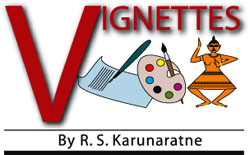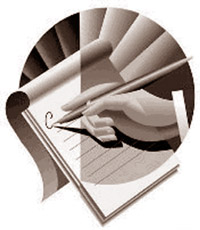Truth and the printed word
 The art of writing was man's vehicle in his long trip from barbarism
to civilization. In the early days of our civilization the ability to
express one's thoughts was considered something wonderful. However,
man's first attempt to express his feelings were very crude. The art of writing was man's vehicle in his long trip from barbarism
to civilization. In the early days of our civilization the ability to
express one's thoughts was considered something wonderful. However,
man's first attempt to express his feelings were very crude.
As he was unable to construct separate words and sentences, he tried
to say what he wanted by means of pictures. Thousands of years had
elapsed when Egyptians invented an alphabet consisting of characters
known as 'Hieroglyphics' or 'priest writing.'
The invention of printing machine by the Chinese was a great
achievement in human history. First they printed on wooden blocks and
then on baked clay slabs. This process was followed by the use of type
made of wood and copper.
Later on Westerners adopted finer methods of printing. The art of
printing made a sharp and lasting impact on the march towards
civilization and people began to believe anything that was in print.
 When printing became common, it began to lose its former value. For
instance, in Great Britain alone about 50,000 titles are published
annually. But most people who read these books, magazines and newspapers
are so conservative in their thinking that even the printed word has
failed to shake their deep-rooted views on life and its multifarious
activities. When printing became common, it began to lose its former value. For
instance, in Great Britain alone about 50,000 titles are published
annually. But most people who read these books, magazines and newspapers
are so conservative in their thinking that even the printed word has
failed to shake their deep-rooted views on life and its multifarious
activities.
It is somewhat cruel to think that in the modern era of civilization
man is no more than a grain of sand which may be thrown helter-skelter
by the winds of circumstances. If any country is poor, it is at the
mercy of the rich. In other words, however much you are virtuous, you
are powerless unless you are entrenched behind the power of money. While
individuals try to earn money more than they require, countries are
running a rat race to become nuclear powers.
It is true to say that those who talk glibly and write profoundly of
our great civilization, whether European, American, Chinese or Russian,
they are doing their countries the greatest dis-service.
Are we not some kind of barbarians still? Can you forget the
atrocities committed by the United States of America in Vietnam some
decades ago?
Super powers with the Charter of Human Rights in their right hand
preach disarmament, non-violence, peaceful co-existence and what not
while keeping their left hand on the controlling keys of the arsenals.
The Iraq war, the political upheavals in Central America, the
strangling of democracy in certain countries and armed insurr-ections
against many elected governments make all the advances made in the field
of science and philosophy from Galileo to Karl Marx a mockery.
If human beings are to be judged by what they do and not by what they
preach and publish in print, their views on human rights, world peace
and brotherhood become not mere nonsense but nonsense on stilts!
The present predicament of the world has made many writers to lash at
social injustice and its roots. The celebrated writer and author of
Passage to India E.M. Forster once said, "Tolerance, good temper and
sympathy are no longer in a world which is rent by religious and social
persecution.
In a world where ignorance rules science plays a subservient role.
People seem to rejoice when they see their fellowmen run into
difficulties and suffer. For instance, when Oscar Wilde the famous
English author was convicted, some so-called civilized women raised
their skirst and danced a jig in the streets outside the Old Bailey.
This shows how far we have gone in the path of civilisation.
If people have scant respect for the printed word, writers are also
responsible to a great extent. Many writers have prostituted their
talents for financial or political gain. It is a tragedy that these
people do not realize that it is detrimental to the healthy growth of
the future generations.
Given the proper balanced thinking, independent newspapers, magazines
and books can take the place of the Bible, The Koran, the Zend Avista or
the Gita. Even today the general reader has a great respect for unbiased
reporting, clear thinking and fearless writing. If the present day
writers make a concerted effort to follow their conscience, they can
arrest much of the rot that is blocking the path of progress.
Civilization in the future will depend less and less on the printed
word because readers are not sure whether every printed word is worthy
of its ink. At times divergent views on important issues are discussed
in the media from different angles.
There should be divergent views on human affairs. However, there
should not be the slightest trace of dishonesty. It is dishonest and
crooked writing that has made readers doubt the printed word.
If all the writers make use of their talents honestly, people will
still believe the printed word. |
